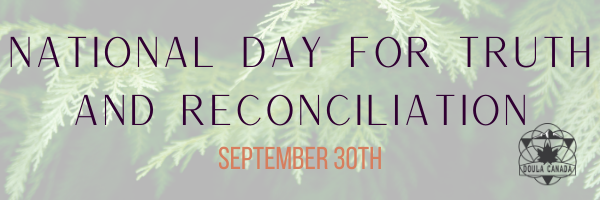[vc_row][vc_column][vc_column_text css=”.vc_custom_1632997516706{margin-bottom: 0px !important;}”]September 30th is now National Day for Truth and Reconciliation. So what does this mean? How does it relate to doula care and birth work?
The National Day for Truth and Reconciliation comes after decades of emotional labour and advocacy from Indigenous communities, as well as a year of grieving Indigenous children and investigating the tragedies of the residential school system. Not only did Indigenous families experience the horrors of this system, but many others as well, such as the epidemic of Missing and Murdered Indigenous Women and Girls (MMIWG), the 60’s scoop, and current extraction of environmental resources.
This is not history. This is happening now. Something needs to change.
Why are we asking members to reflect today? Besides being citizens on Indigenous lands, birth and postpartum workers interact directly with Indigenous families, and play an integral role in mitigating systemic oppression and intergenerational trauma.
For example:
- Providing culturally sensitive care and awareness when working with Indigenous families
- Providing trauma-informed care for those impacted by violence and adult child survivors of the child protection system
- Creating space for cultural birthing practices
- Advocating against racialized medical violence
Getting comfortable with truth and reconciliation requires a lot of discomfort. This is okay. It is only when we face our shortcomings head on that we can progress toward change. We welcome you to reflect on some questions today.
Reflection Questions for Doulas:
- How have I benefited from capitalism, colonialism, and extraction of resources?
- How have I upheld colonial norms that can potentially cause harm?
- What did I learn growing up about the history of Canada and Indigenous Peoples?
When we can acknowledge we are a product of wider system indoctrinations like white supremacy, colonialism, etc. we can separate our character from the issues at hand. Good people can do harm. Good people are capable of racism, classism, and perpetuating colonial norms. Shame restricts us from moving forward.
In an effort to show this to you, here is mine. As an Indigenous person, I am still capable of perpetrating colonial harm.
- I benefited from colonial post-secondary institutions and obtaining a western education
- I have upheld colonial norms in the social work field as a mandated reporter
- I learned in elementary school that Canada obtained the land fairly and through agreement with Indigenous Peoples. Since then, I have done a degree in Indigenous Studies and learned about the tragedies of colonialism.
Don’t know where to start? Dr. Lynne Davis of Trent University and her class “Transforming Settler Relations” have compiled a database of Canadian initiatives that support allyship, education, and decolonization. Find an initiative here: https://transformingrelations.wordpress.com/
You can take action today by signing up for our trauma series this fall. The workshop “Intergenerational Trauma: The Doula Connection” on October 28 from 7-8:30pm EST will focus primarily on working with Indigenous families impacted by trauma and systemic oppression. All proceeds will go to The Indigenous Foundation.
To any Indigenous and non-Indigenous doulas who have questions, need support, or would like to chat about truth and reconciliation, please contact Kayt at kayt@stefanie-techops.wisdmlabs.net
Miigwetch,
Kayt Ward (She/Her)
Indigenous Inclusion and Engagement Lead, BSW[/vc_column_text][/vc_column][/vc_row]

